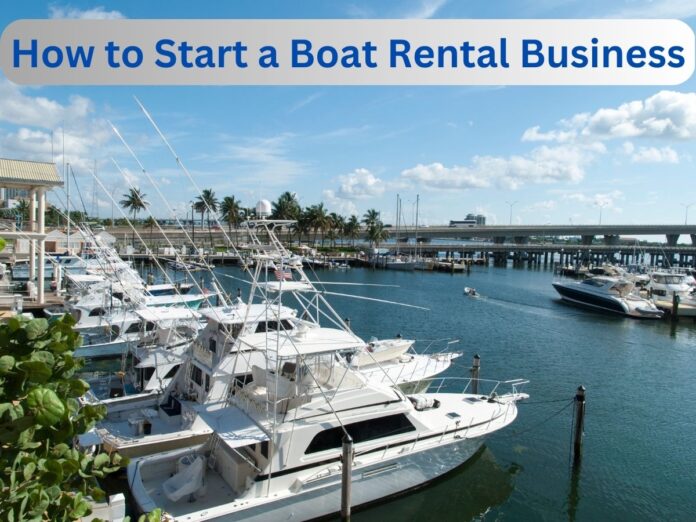The boat rental industry is a popular and profitable business that allows clients to enjoy the pleasures of boating without the financial commitment of owning a boat. Customers can rent everything from kayaks and canoes to luxury yachts and motorboats from boat rental companies.
With an increase in interest in outdoor activities and experiences, the boat rental market gives an ideal opportunity for entrepreneurs wishing to establish their own business and capitalize on this increasing trend.
In this blog post, we will discuss how to start a boat rental business and explore various aspects of the industry, including market research, business planning, financing, boat acquisition, insurance, marketing, operations and management, and financial management.
Step 1: Market Overview of Boat Rental Business
Anyone interested in beginning a boat rental business in the United States should conduct market research beforehand. It assists you in understanding the industry’s size and trends, as well as identifying prospective possibilities and obstacles. According to IBISWorld, the boat rental market in the United States is worth around $5.4 billion, with a 2.6% growth rate in 2023.
The growing demand for luxury boats and yachts for events such as corporate parties, weddings, and other special occasions is one of the trends in the US boat rental market. Smaller watercraft, such as jet skis, kayaks, and paddleboards, are also popular among the younger population.
Another development is the rise of peer-to-peer boat rental platforms, which allow boat owners to hire out their boats to others, making renting a boat more economical and flexible.
Key Competitors in this Industry in the United States
Identifying the top rivals in the US boat rental sector is a critical step in market research for anyone considering starting a boat rental business. Here are some of the industry’s significant players:
- Boatsetter – A peer-to-peer boat rental marketplace that links boat owners and renters.
- GetMyBoat – Another peer-to-peer boat rental business that rents out everything from kayaks to yachts.
- Cruise America – A company that specializes on RV and motorhome rentals but also rents boats in certain locations.
- The Moorings – A yacht charter company that provides luxury boat rentals all around the world, including the United States.
- Carefree Boat Club – A membership-based boat rental organization that provides members with access to a fleet of boats located throughout the United States.
- Freedom Boat Club – Another membership-based boat rental business that provides members with access to a fleet of boats located throughout the United States.
Step 2: Develop a Business Plan
A well-written business plan can assist you in identifying potential problems, setting realistic goals, and developing a strategy for reaching those goals. Here are some of the main advantages of having a business strategy for your boat rental company:
- Aids in financing: When seeking financing from investors or lenders, a sound business plan is frequently necessary. It exhibits your knowledge of the sector as well as your ability to build a sustainable firm.
- Establishes defined objectives: A business plan explains your company’s objectives, plans, and techniques. It assists you in focusing on what you want to do and how you intend to accomplish it.
- Identifies target market: Market research will be included in your business plan to assist in identifying your target market and their needs. This information is crucial for building marketing strategies and adapting your services to your clients’ needs.
- Assists in decision-making: Your business plan will include a financial plan that details your expected income, expenses, and cash flow. This data will allow you to make more educated decisions about pricing, equipment purchases, and employment.
- Provides a growth roadmap: A business plan is important not just for launching your boat rental business, but also for growing and extending it. Your business plan should explain your plans for boosting income, expanding your fleet, and entering new markets.
A business plan is essential for any entrepreneur looking to launch a boat rental business in the United States.
Startup Stunners has been providing high-quality business plan writing services for years, and we’re ready to assist you in developing a complete, effective strategy that will move your company ahead.
Our team of professionals is committed to assisting you in achieving your company objectives and obtaining finance from banks, grants, or other sources. We’re here to help you succeed whether you’re a newbie, entrepreneur, or small company owner. Don’t put it off any longer; visit startupstunners.com/contact-us/ today and let us lead you to success!
Step 3: Investment Required for Boat Rental Business
1. Initial Investment
Starting a boat rental business in the United States can be costly. Here are some examples of common startup costs:
• Boat(s): The price of the boat will be determined by its kind, size, and condition. A new boat can cost anywhere between $20,000 and $100,000 or more, whereas a used boat can cost anywhere between $5,000 and $50,000.
• Boat Dock/Slip: Prices vary greatly depending on location and type of dock or slip required. You may be needed to acquire a permit or lease a slip from a marina in some places, which can run from $1,000 to $10,000 per year.
• Equipment and Supplies: You’ll need to buy things like life jackets, paddles, ropes, anchors, and other safety equipment. These materials might range in price from $1,000 to $5,000 on average.
• Insurance: You must obtain insurance to cover your boats and liability. The cost of insurance will vary according to the number of boats you own and the type of coverage you require. Boat rental insurance can range from $2,000 to $5,000 per year on average.
• Legal and accounting fees: You may need to employ an attorney or accountant to assist you with the legal and financial elements of launching your new firm. These fees might range from $1,000 to $5,000 on average.
• Marketing and Advertising: To promote your firm, you will need to invest in marketing and advertising. This can entail developing a website, advertising on social media, and printing advertisements. These costs can range from $500 to $5,000 on average.
2. Recurring Expenses
In addition to the beginning expenditures, recurring expenses must be considered. Here are some examples of usual expenses:
• Dock/Slip Fees: As previously stated, you may have to pay monthly or annual fees to lease a dock or slip.
• Maintenance and Repair: Boats require routine maintenance and repairs on occasion. The price will vary according to the type and age of the boat, as well as the frequency of use. Maintenance and repairs might cost between $2,000 and $5,000 per year on average.
• Gasoline and Docking Fees: You must budget for gasoline and docking fees, which vary depending on location and usage.
• Insurance: As previously stated, you will need to maintain liability and boat insurance coverage.
• Marketing and Advertising: To attract new clients and maintain existing ones, you will need to continue to invest in marketing and advertising.
Step 4: Boat Acquisition
You will need boats to rent out to consumers when launching a boat rental business. Here are a few choices for purchasing or leasing a boat:
1. Buy New Boats: Buying a new boat from a dealer or manufacturer can provide you with a warranty and the most up-to-date technologies. It may, however, be more expensive than alternative options. You can look for new boats online or in a nearby dealership.
2. Buy Used Boats: Buying used boats is a low-cost choice, but it comes with the danger of hidden damage and maintenance. Used boats for sale can be found online, at boat dealerships, or from private sellers.
3. Leasing Boats: If you don’t have enough money to buy a boat altogether, leasing is an option. Leasing choices vary, but most involve a down payment as well as monthly payments. Leasing can also allow you to upgrade your fleet as your company grows.
4. Participate in Boat Sharing Programs: Boat sharing programs might provide an exceptional opportunity to obtain boats at a lesser cost. Programs such as Boatsetter or GetMyBoat allow owners to post their boats for rental when they are not in use, allowing you to offer a diverse range of boats without owning them all.
Step 5: Considerations for boat maintenance and repair
Boat maintenance and repair are essential elements of operating a boat rental business. Lack of upkeep might result in costly repairs and safety issues. Here are several boat maintenance and repair considerations, as well as their associated costs:
1. Routine Maintenance: Cleaning, oil changes, checking fluid levels, and replacing old parts are all part of routine maintenance. Regular maintenance saves money on expensive repairs and extends the life of your boat. Depending on the kind and size of the boat, maintenance expenditures might range from $500 to $1,500 per year.
2. Seasonal Maintenance: Winterization, spring commissioning, and preparing the boat for storage are all part of seasonal maintenance. These maintenance procedures are critical for protecting your boat from adverse weather and keeping it in good shape. Seasonal maintenance might cost anything from $1,000 to $2,500 per boat each year.
3. Repairs: Boats may require repairs as a result of normal wear and tear, accidents, or technical breakdowns. Repair costs vary greatly based on the type of repair required. Minor repairs, such as replacing a damaged propeller or repairing a broken latch, can cost a few hundred dollars, whereas large repairs, such as engine replacement, might cost thousands of dollars.
4. Insurance: Insurance is a must-have for boat rental companies. You must have insurance coverage for your boats, as well as liability and rental boat insurance. Insurance costs can range from $2,000 to $5,000 per year, depending on the type and number of boats you own, the level of coverage you select, and where you live.
5. Dockage and Storage: When not in use, boats must be docked or stored in a storage facility. The cost of dockage and storage varies according to location and boat size. A boat can be stored in a marina or dry storage facility for $300 to $1,000 per month.
Step 6. Insurance

Boat rental companies need various types of insurance to safeguard themselves, their customers, and their boats. Here are the primary types of boat rental business insurance, along with their anticipated costs:
1. Boat Insurance: Boat insurance protects your boat from damage caused by accidents, storms, theft, or other risks. Boat insurance costs vary according on the kind, size, and value of your boats, as well as your location and usage. Boat insurance can range from $300 to $5,000 per year per boat, depending on the coverage you select.
2. Liability Insurance: Liability insurance protects your company from claims of bodily harm or property damage caused by your vessels or operations. It is critical to have enough liability coverage to safeguard your company from costly claims. Liability insurance can range in price from $1,000 to $3,000 per year.
3. Rental Boat Insurance: Rental boat insurance protects you in the event that a customer damages or injures themselves while renting one of your boats. Most states need rental boat insurance, which is often included in your liability coverage. The cost of rental boat insurance varies depending on the coverage you choose and the number of boats you rent.
4. Workers’ Compensation Insurance: If you have employees, workers’ compensation insurance will be required to cover medical expenses and missed pay in the event of work-related injuries or illnesses. Workers’ compensation insurance costs vary by state, but on average, it can range from $1,000 to $5,000 per year per employee.
Step 7: Obtaining licenses and permits for Boat Rental Business
The licenses and permits required for a boat rental business vary depending on state and municipal requirements. The following are some general regulatory requirements as well as state-specific regulatory needs for five states:
1. General Prerequisites:
• Business License: To operate any form of business, a general business license is required.
• Sales Tax Permit: To collect and remit sales tax on rents, a sales tax permit is required.
• Boater Education Certificate: Some states require rental boat operators to have a boater education certificate.
• Coast Guard Safety Inspections: The United States Coast Guard may require safety inspections on rental boats.
2. Requirements Specific to Each State:
a. Florida:
- Florida Fish and Wildlife Conservation Commission License: This license, which costs roughly $300, is necessary for commercial vessel operations.
- Boating Safety Education: Boat rental operators must undergo and pass a boating safety education course.
b. California
- Department of Parks and Recreation License: Required for businesses operating in California State Parks and Recreation regions.
- Boater Card: All operators of motorized boats in California are required to have a boater card.
c. Texas
- Boater Education: All boat rental operators must complete a boater education course and pass a test.
- Parks and Wildlife Department License: This is necessary for commercial rental enterprises and costs approximately $300.
Learn more about licensing requirements in your state by visiting SBA’s reference to state licenses and permits.
Step 8: Manage Your Money
A. Revenue Sources for a Boat Rental Company:
1. Boat Rentals: The principal source of revenue for a boat rental firm is boat rentals. Prices vary according to the type of boat, location, and length of hire. Boat rental fees typically vary from $50 to $200 per hour, with daily rates ranging from $300 to $1,000 per day.
2. Equipment Rentals: In addition to boats, you can hire out life jackets, water skis, and wakeboards. This can generate additional revenue while also improving the consumer experience. The cost of renting equipment ranges from $10 to $50 per item per day, depending on the type of equipment.
3. Tours and Charters: Tours and charters can be a high-end service that generates a lot of money. Depending on your customers’ demands, you can sell tours and charters by the hour or as a package. Tours and charters can cost anywhere from $500 to $2,000 or more, depending on the sort of tour and duration.
4. Lessons and Training: If you have qualified teachers on staff, you can create additional cash by offering lessons and training. Lessons and instruction can cost anywhere from $50 to $200 per hour, depending on the type of lesson and the instructor’s qualifications.
B. Cost-cutting Strategies:
1. Maintenance: Proper boat and equipment maintenance can assist reduce repair expenses and extend the life of your assets.
2. Fuel Efficiency: Encouraging consumers to operate the boats in a fuel-efficient manner can assist in lowering fuel expenditures.
3. Insurance: Getting the correct insurance coverage will help protect your company from liability claims while also lowering the costs connected with accidents or boat damage.
4. Marketing: Effective marketing can increase sales and lower customer acquisition costs.
5. Staffing: Having the right amount of people on the job can help you save money while still providing good customer service.
To make informed decisions for your boat rental business, you need to track your finances and understand your revenue and expenses. Our Net Profit Calculator can help you do just that – simply input your revenue and expenses, and the calculator will tell you your net profit. This calculator is a useful tool for staying on top of your finances and making data-driven decisions for your business.
Conclusion
To summarize, beginning a boat leasing business can be a profitable venture, but it takes careful preparation and execution. Understanding the market, competition, and regulatory requirements is critical to running a profitable and successful firm. Boat rentals, equipment rentals, tours and charters, and lessons and training can all produce revenue for a boat rental company.
To limit expenses and optimize earnings, proper cost management is required, including boat maintenance and insurance, staffing, and marketing. Overall, a boat rental business may provide a unique and thrilling experience for clients while also giving a successful business opportunity for entrepreneurs in the US market with the correct plan and execution.
Frequently Asked Questions
What kind of boats should I offer for rental?
The type of boats you rent out are determined by a variety of factors, including market demand, competition, and the body of water where the business is located. In general, you can provide pontoon boats, fishing boats, jet skis, sailboats, and powerboats.
How much does it cost to start a boat rental business?
The cost of beginning a boat rental business is determined by a variety of factors, including the type and quantity of boats, location, marketing costs, and insurance costs. Startup expenditures might range from $50,000 to $500,000 or more on average.
What kind of insurance do I need for a boat rental business?
As the owner of a boat rental company, you must have commercial liability insurance to cover any accidents or injuries that occur on the rented boats. Hull insurance may also be required to cover any damage to the boats. The cost of insurance is determined by various factors, including the number of boats, their worth, and the location of the firm.
Do I need any licenses or permits to start a boat rental business?
To start a boat rental business, you must obtain various licenses and permissions, including a business license, sales tax permit, and boating safety education certification. Specific rules differ per state, so check with local authorities to verify compliance.
How do I promote my boat rental business?
You can market your boat rental company through a variety of marketing methods, including social media, email marketing, search engine optimization, and local advertising. You can also collaborate with local tourism and hospitality companies to cross-promote your services and raise brand awareness.
How can I ensure the safety of my customers on rented boats?
To protect your customers’ safety, you must supply suitable safety equipment, such as life jackets and first aid kits, as well as educate them on boating safety. You should also inspect and maintain your boats on a regular basis to avoid mechanical problems or malfunctions.






